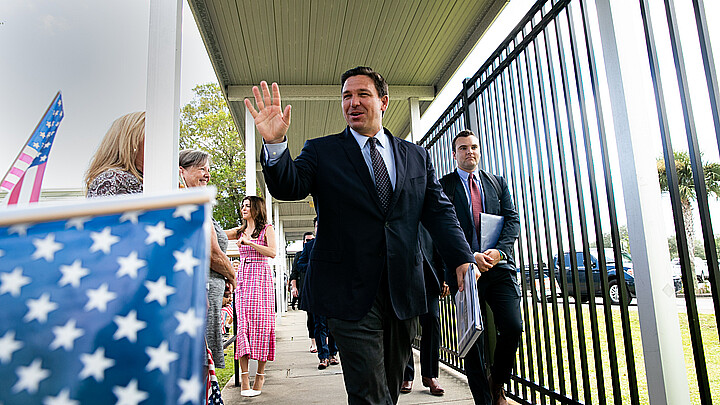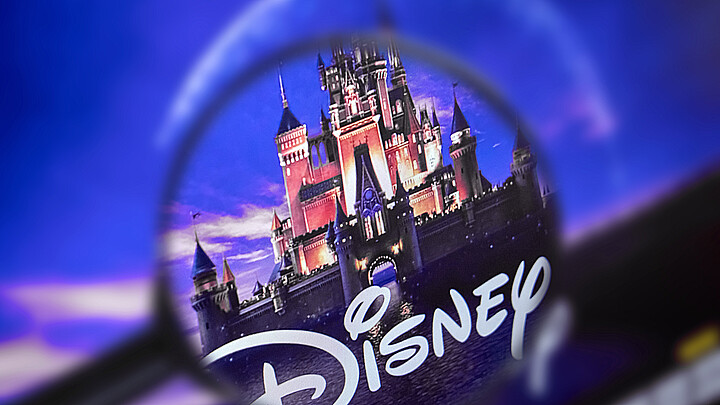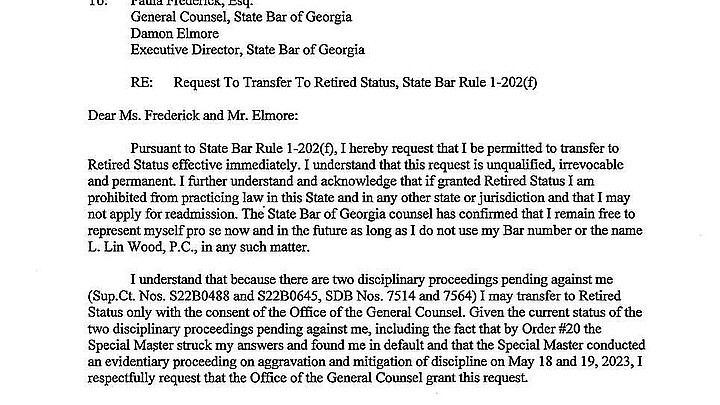Business
Florida Governor to ships at sea: ‘Reroute your thinking’
Florida Gov. Ron DeSantis says Florida’s 15 ports and $117 billion maritime trade industry can save Christmas. “We have to make sure people can go Christmas shopping as normal. We have to make sure all the necessities are there,” DeSantis told reporters as he toured
October 19, 2021 4:50pm
Updated: October 21, 2021 3:28pm
Florida Gov. Ron DeSantis says Florida’s 15 ports and $117 billion maritime trade industry can save Christmas.
“We have to make sure people can go Christmas shopping as normal. We have to make sure all the necessities are there,” DeSantis told reporters as he toured Jacksonville’s JAXPORT seaport Tuesday amid reports of global supply chain bottlenecks and ships log-jammed outside California ports.
“And if it's because ships are sitting off the coast somewhere else, and they can be rerouted here, and we can get all those shelves stocked, then we want to be a part of that solution,” DeSantis said. “We’re here. We have capacity.”
DeSantis and Congressional Republicans have been critical, of the Biden administration’s handling of the supply chain pile-up. The governor said Florida has invested more than $1 billion in 70 port projects since 2019 and the Sunshine State can handle what California, Oregon and Washington right now cannot.
“Our seaports are used to operating around-the-clock, they're used to moving cargo for American families, farmers and businesses,” DeSantis said. “And we think this is a great solution given our capacity for some of the problems you see in other parts of the country.”
Florida saw a $14.1 billion decline in its $117 billion maritime trade industry as cargo tonnage moving through its 15 seaports fell by 8.4%, with exports down 20% and imports down 13.8%, during pandemic-skewered 2020.
But according to a report published earlier this year, Florida’s seaports – where nearly 40% of U.S.-manufactured goods are exported, supporting 900,000 jobs nationwide — are poised for a robust rebound in the “emerging post-pandemic world.”
“Most of the declines in 2020 occurred during the first six months of the year at the height of uncertainty surrounding COVID-19,” the Florida Seaports Transportation & Economic Development Council (FSTED) maintains in its 110-page report, ‘Seaport Mission Plan: Navigating Beyond the Pandemic,’ an annual update required by lawmakers when they created the council in 1990.
Although overall Florida maritime trade declined by 16.1% in 2020, the report notes cargo volumes increased in three of the 15 ports – up 54.5% at Port Manatee, 49.9% at Port Tampa Bay, 33.5% at Port Panama City.
Japan was Florida’s top trade partner in 2020, edging out China for the second straight year, according to the report, which cites South/Central America and Caribbean ports as most-linked to Florida in maritime trade.
Breakbulk cargo increased 8.8% to 7.8 million tons in 2020. Breakbulk shipping transports goods that cannot fit in standard-sized shipping containers, such as vehicles, steel girders, structural steel, manufacturing and construction equipment.
FSTED notes more than $3.3 billion in capital improvements are planned for Florida ports in the next five years with 70.7% – $2.3 billion – tabbed for Atlantic coast seaports.
The capital plan is essentially the 2020-24 Five-Year Seaport Mission Plan developed by the Florida Ports Council (FPC), which abdicates on behalf of port managers and businesses.
DeSantis’ was in Jacksonville Tuesday with state Department of Transportation Secretary Kevin Thibault and FPC officials to mark the debut of a state-adopted incentive program at JAXPORT that helped it secure a contract with a European shipping company to bring an estimated 1,000 additional containers a week through the port.
"With the different operations that we offer, both rail and road, it really, really, really is, I think, a model for the rest of the country," DeSantis said. “This will make a huge difference. If you think about a place like Jaxport, you have 100 million consumers that live within one day's drive of Jaxport. And I think companies are noticing. They're noticing that Florida could be the solution for some of these logistical problems."
“We want your business,” Port Tampa Bay CEO Paul Anderson said. “Reroute your thinking. Reroute your cargo to come to Florida. We stand ready to offer you incentives that will make it ideal and cost savings, so that these men and women in our ports can move your cargo to get to consumers, so Gov. DeSantis can late-shop and still get what he needs.”










